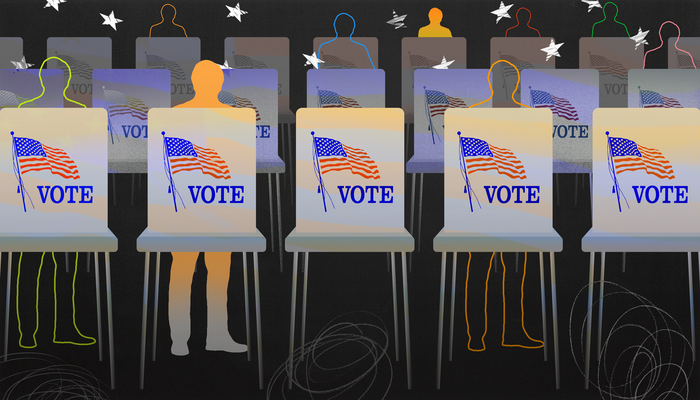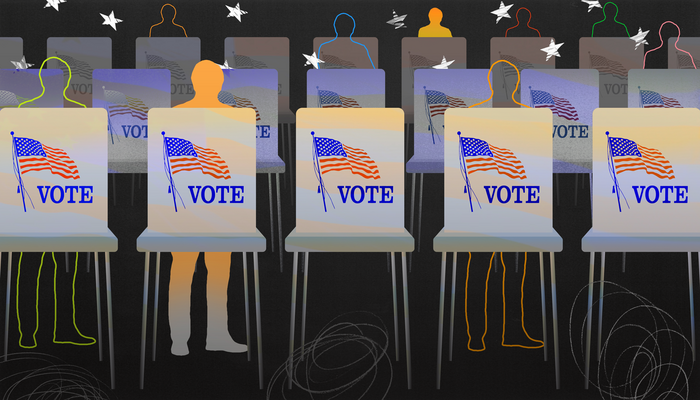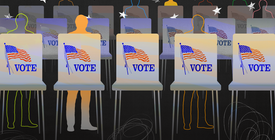Fact #1: Noncitizens are not permitted to vote in federal elections, and instances of noncitizen voting are very rare.
Federal law prohibits noncitizens from voting in federal elections. Election processes are full of checks to identify ineligible voter registrants. Under federal law, states are required to conduct regular list maintenance to remove ineligible voters from the rolls. Many states also participate in the Electronic Registration Information Center, which allows states to compare their voter rolls across state lines and ensure lists are kept accurate and up-to-date.
The names and addresses of all voters are recorded, and severe penalties exist for violators, who would risk jail time or deportation. A noncitizen working toward naturalization could be denied citizenship for merely being registered to vote. State-led investigations by Republican and Democratic officials have found almost no instances of noncitizen voting. Similarly, investigations by news organizations, law enforcement departments, and universities have found that noncitizen voting is extraordinarily rare.
Rumor: Noncitizens are voting in federal elections.
With significant political attention on our domestic borders, false allegations that noncitizens are fraudulently casting ballots are circulating on social media. As voter list maintenance procedures are complicated, and often boring, members of the public are often unaware of the many procedures in place to keep our voters file accurate and up-to-date, and prevent noncitizens, and other ineligible voters, from registering and casting ballots. Bad actors are exploiting this education gap to spread false information and concern about the integrity of our elections.
We worked with Swayable, a research software platform that measures how effectively media content changes opinions, to determine what messages helped voters best understand the facts.
Messages studied:
- States have multiple systems in place to deter noncitizen voting. Those who violate the law face prison time and deportation.
- My state is a member of a voter registration compact which provides an extra layer of protection to keep our voter files accurate and helps ensure that noncitizens can’t cast a ballot.
- The name and address of everyone who votes is public record. Noncitizens who violate the law by voting face prison time and deportation.
The first message (bolded above) was found to be most effective in communicating the facts, though differences exist by region and demographic group. See Swayable’s dashboard to examine the results in greater detail.
Fact #2: Many checks exist to ensure that voting machines accurately count ballots.
Election officials know that there is no such thing as an invulnerable technological system, and for that reason deploy a series of safeguards and checks to ensure an accurate count. While each state’s procedures are different, among the most common, voting machines are certified to federal and state security standards before being deployed; they are tested before voters cast their ballots to make sure they are working properly; and they are audited again after elections to confirm they correctly counted ballots and produced an accurate total. Importantly, 99% of voters live in jurisdictions where they can cast a ballot with a paper record of their vote, which can be used to confirm the electronic total is correct.
Rumor: Voting machines are routinely hacked to change election results.
Conspiracy theories about hacked voting machines have proliferated since the 2020 presidential election. More recently, election “deniers” have pushed for jurisdictions to abandon voting machines altogether and hand count all ballots, despite evidence showing this method leads to longer, more costly, and less accurate vote counts. Genuine security concerns about voting machines have also contributed to this narrative, with opportunistic political actors using the possibility of vulnerabilities in election technology (as is the case with any technology) to claim that voting machines have in fact been exploited to alter election results, even though there is no evidence of the latter. A challenge to the use of voting machines in Georgia has revived this rumor in recent weeks. Unfortunately, many of the related soundbites and social media posts lack context about the security measures that are in place to prevent, catch, and recover from any incursion into or failure of voting systems.
Messages studied:
- Election officials audit voting machines at every step to make sure votes are recorded correctly, and they maintain a ballot chain of custody. We would know if voting machines were hacked.
- 99% of voters live in places with a ballot paper trail, and election officials audit results to compare the paper trails to machine totals. We would know if voting machines were hacked.
- Election officials conduct logic and accuracy testing on all voting machines before an election to ensure that the machines are working correctly and haven’t been tampered with. We would know if voting machines were hacked.
The first message (bolded above) was found to be most effective in communicating the facts, though differences exist by region and demographic group. See Swayable’s dashboard to examine the results in greater detail.





